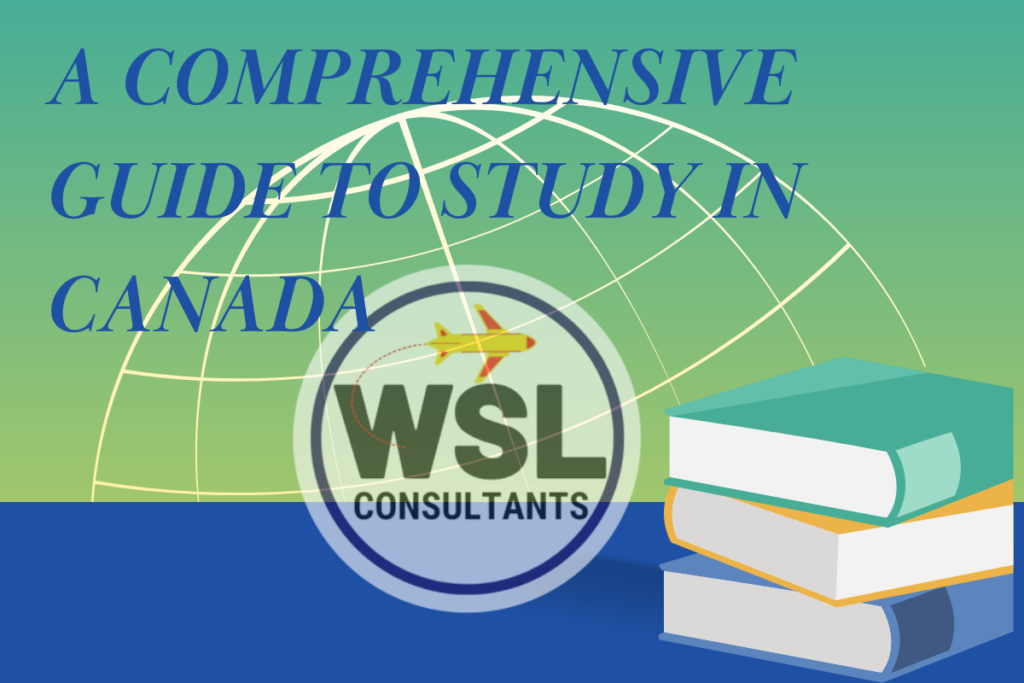
Canada is a top destination for international students, offering high-quality education, a multicultural environment, and abundant opportunities. For Pakistani students, the prospect of study in Canada is exciting, combining academic excellence with a chance to experience cultural landscape. This guide delves into the essentials of the process, helping you navigate the journey from Pakistan to a Canadian classroom.
Journey to study in Canada
The journey to study in Canada begins with thorough research and planning. It’s crucial to understand the Canadian educational system, the variety of programs available, and the lifestyle you can expect. Additionally, you must be aware of the legal and financial aspects, including obtaining a study permit and managing tuition and living expenses. This guide aims to provide a comprehensive overview to ease your study in Canada.
Research Programs and Institutions:
Study in Canada boasts a wide array of universities and colleges, each offering unique programs and experiences. When selecting an institution, consider factors such as the program’s reputation, faculty expertise, campus facilities, and the university’s location. Research the cities where these institutions are located, as the local culture, climate, and living expenses can significantly impact your experience.
Moreover, it’s important to align your academic goals with the programs offered. Canadian institutions provide a range of undergraduate, postgraduate, and doctoral programs. Visit university websites, attend virtual fairs, and connect with current students or alumni to gain insights. Additionally, consider the potential for research opportunities, internships, and co-op programs that can enrich your academic and professional journey.
Understand Admission Requirements:
Admission requirements in Canadian universities vary, but there are commonalities. Academic transcripts demonstrating your previous education are essential. These need to be translated into English or French and may require an equivalency assessment. Standardized test scores, such as SAT, ACT, GRE, or GMAT, might be required depending on the program level and field of study in Canada.
Language proficiency is key. As English is the primary language of instruction in most institutions, proficiency tests like IELTS or TOEFL are mandatory. Some universities offer conditional acceptance, allowing students to enroll in language courses before starting their main academic program. Additionally, letters of recommendation and a well-crafted statement of purpose or personal essay can significantly bolster your application.
Application Process:
Applying study in Canada universities is a detailed process. Most applications are submitted online through the university’s admission portal. Be mindful of application deadlines – these can vary significantly between institutions and programs. It’s advisable to apply to multiple universities to increase your chances of acceptance.
During the application process, pay close attention to the details. Ensure that your application form is completely filled, and all necessary documents are attached. This includes your academic records, test scores, language proficiency results, and any other required documents. Some programs may also require portfolios or interviews as part of their selection process.
Acceptance Letter:
Receiving an acceptance letter from a Canadian university is a significant milestone. This letter is more than just a confirmation of your admission; it’s a crucial document for your study permit application. Ensure you carefully review the offer, including any conditions that must be met before your enrollment is finalized.
Upon acceptance, universities typically provide detailed information about the next steps, including how to confirm your acceptance. This may involve paying a deposit or tuition fees, which is often a requirement for your study permit application. It’s also a time to celebrate your achievement and prepare for the exciting journey to study in Canada.
Apply for a Study Permit:
A study permit is essential for your legal status as a student in Canada. The application process involves several steps and requires various documents, including your acceptance letter, passport, and proof of financial support. You must demonstrate that you have enough funds to cover your tuition fees and living expenses.
The application for a study permit can be done online or at a Canadian visa application center in Pakistan. It’s crucial to apply as soon as you receive your acceptance letter, as processing times can vary. You may also need to undergo a medical exam and provide a police clearance certificate as part of the application.
Prepare for Departure:
Once your study permit is approved, it’s time to prepare for your move to Canada. This involves practical aspects like booking your flight, arranging accommodation, and packing suitable clothing, especially considering Canada’s diverse climate. Research your destination city, understand public transportation options, and learn about the local culture and customs.
Additionally, it’s wise to connect with other Pakistani students who might be study in Canada or join online forums and social media groups. These connections can provide valuable advice and support as you transition to life in a new country. Also, consider attending pre-departure orientations organized by Canadian embassies or educational consultants, offering insights into Canadian culture and student life.
Secure Health Insurance:
Health insurance is a mandatory requirement for Pakistani students to study in Canada. Some universities include health insurance in the tuition fees, while others require students to arrange it independently. It’s important to understand the coverage provided and ensure it meets the provincial requirements where you’ll be studying.
The cost and coverage of health insurance can vary, so compare different plans and choose one that best suits your needs. Remember, health insurance is crucial not only for meeting legal requirements but also for ensuring your well-being during your study in Canada.
Explore Scholarships and Financial Aid:
Financing your study in Canada can be challenging, but there are numerous scholarships and financial aid options available for Pakistani students. These can range from partial to full scholarships, covering tuition fees, living expenses, or both. Research scholarships offered by Canadian universities, Pakistani government scholarships, and international organizations.
Applying for scholarships requires careful planning and attention to detail. Ensure you meet the eligibility criteria and submit all required documents. Deadlines for scholarship applications may differ from admission deadlines, so keep track of these dates. Even if you don’t secure a scholarship initially, some universities offer financial aid or bursaries to students after enrollment based on academic performance.
Work While Studying:
Working part-time while studying is a great way to gain work experience and manage living expenses. While study in Canada, Pakistani students are allowed to work up to 20 hours per week during academic sessions and full-time during scheduled breaks, like summer or winter vacations. This work experience can be invaluable, offering a glimpse into the Canadian work culture and helping build your professional network.
To work in Canada, ensure your study permit allows it. Most study permits do come with a condition that permits part-time work. Look for job opportunities on campus or in local businesses. Balancing work and study requires good time management skills, but it can significantly enhance your study in Canada.
Stay Informed on Visa Policies:
Canadian visa policies and regulations can change, so it’s important to stay informed. Regularly check the Immigration, Refugees, and Citizenship Canada (IRCC) website for the latest information. This includes rules about study permits, work eligibility, and post-graduation work permits.
Being aware of these policies is crucial not only for compliance but also for planning your future in Canada. For instance, understanding the criteria for extending your study permit or transitioning to a work permit after graduation can help you make informed decisions about your study in Canada.
Join Student Communities:
Joining student communities, especially those with fellow Pakistani students, can provide a support network that eases your transition into Canadian life. These communities can offer practical advice, emotional support, and a sense of belonging. Many universities have international student societies or country-specific clubs, which are great platforms to connect with peers.
Engaging in these communities can also enhance your academic experience. They often organize events, workshops, and networking opportunities, allowing you to learn outside the classroom and build relationships that can benefit your personal and professional life.
Post-Graduation Planning:
Thinking ahead to your post-graduation plans is important. Canada offers various opportunities for graduates, including the Post-Graduation Work Permit Program (PGWPP), which allows students who have completed their studies to study and work in Canada. The duration of the permit depends on the length of your study program.
If you wish to stay in Canada after your studies, start planning early. Understand the requirements for work permits, explore job markets in your field, and take advantage of career services provided by your university. Networking and gaining Canadian work experience through internships or co-op programs during your studies can significantly enhance your prospects after graduation.
Conclusion
Embarking on study in Canada is an exciting and transformative experience for Pakistani students. It offers a blend of high-quality education, multicultural exposure, and personal growth. By following this detailed guide, from choosing the right program to planning for your post-graduation career, you can navigate the process with confidence and make the most of your adventure of study in Canada. Remember, preparation, research, and a proactive approach are key to a successful and rewarding experience study in Canada.
FAQs
1. What are the English language requirements for Pakistani students to study in Canada?
- Most Canadian institutions require proficiency in English. This is usually proven through standardized tests like IELTS or TOEFL. The required score varies by institution and program, but a minimum IELTS score of 6.5 or TOEFL score of 80-100 is common.
2. How much are the tuition fees for international students in Canada?
- Tuition fees vary significantly depending on the institution and program. On average, international students can expect to pay between CAD 20,000 to CAD 30,000 per year for undergraduate programs. Postgraduate programs may have higher fees.
3. Can Pakistani students work while studying in Canada?
- Yes, Pakistani students can work up to 20 hours per week during academic terms and full-time during scheduled breaks, such as summer and winter holidays, without a separate work permit.
4. What is the process for obtaining a Canadian study permit?
- To obtain a study permit, you need to apply online or through a Canadian visa application center in Pakistan, providing your acceptance letter, a valid passport, proof of sufficient funds, and other necessary documents. The process also involves submitting biometrics and potentially undergoing a medical exam.
5. How much funds are required to show for the Canadian study permit?
- Apart from tuition fees, you need to prove that you have enough funds to cover your living expenses. This is generally around CAD 10,000 to CAD 15,000 per year, depending on the location in Canada.
6. Are scholarships available for Pakistani students in Canada?
- Yes, there are various scholarships available for international students, including those from Pakistan. These scholarships are offered by Canadian universities, the Canadian government, and various international organizations. They vary in terms of value and criteria.
7. What is the duration of a Canadian study permit?
- The study permit is usually valid for the length of your study program, plus an extra 90 days. The additional days allow you time to leave Canada or extend your stay.
8. Can Pakistani students apply for Permanent Residency (PR) in Canada after studies?
- Yes, many international students apply for PR through programs like the Canadian Experience Class (CEC) under the Express Entry system. Gaining Canadian work experience through programs like the Post-Graduation Work Permit (PGWP) can enhance eligibility.
9. What are the accommodation options for students in Canada?
- Students can choose between on-campus residence (dormitories), off-campus rental apartments, homestays, or shared accommodations. The choice depends on budget, convenience, and personal preference.
10. Is health insurance mandatory for Pakistani students in Canada? – Yes, all international students in Canada are required to have health insurance. Some provinces offer provincial health coverage for students, while in others, students must arrange private health insurance.
